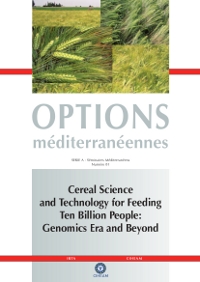| Article précédent | p. 299-303 | Article suivant |
Transgenic cereals with enhanced resistance to abiotic stress through metabolic engineering
A number of current studies have focused on the polyamine biosynthetic pathway as a model to unravel particular key factors that still represent bottlenecks in metabolic pathway engineering in plants. Engineering of metabolic pathways in plants has been carried out in some cases, with the aim of enhancing production of a natural product that can improve the nutritional properties of plants or protect plants from environmental stresses. By engineering rice plants with the oat adc cDNA under the control of two different promoters we demonstrated a correlation between polyamine accumulation and the ability of dedifferentiated tissue to undergo morphogenesis. Our studies also suggested that a key element in facilitating changes in polyamine levels in transgenic tissues is the strength of the promoter used to drive expression of individual transgenes. Based on these results we developed a model which stipulates a minimum threshold in putrescine concentration prior to its further conversion into the higher polyamines spermidine and spermine. Our experiments also demonstrated that seed, rather than vegetative tissue, is the preferred organ for polyamine accumulation and storage. Our studies shed further light on the complexity of polyamine biosynthesis in intact plants and tissues and provide a basis for further manipulations using additional genes in the polyamine pathway. We will use this pathway as an example to illustrate one of the strategies used in metabolic engineering, the enhancement of an existing metabolic pathway using a single metabolic engineering approach to improve simultaneously the nutritional properties of plants and also to afford protection against environmental stresses, thus improving crop yields.
- [ Afficher ]
- [ Télécharger ]
- [ Exporter la citation ]
Vous pouvez télécharger la citation au format :
- [ Imprimer ]
-
Mots-clés
CEREALE, METABOLISME, MORPHOGENESE, PLANTE TRANSGENIQUE, POLYAMINE, PUTRESCINE, RIZ, STRESS ABIOTIQUE, TRANSGENESECiter cet article
Capell T., Bassie L., Peremarti A., Zhu C., Christou P. Transgenic cereals with enhanced resistance to abiotic stress through metabolic engineering. In : Molina-Cano J.L. (ed.), Christou P. (ed.), Graner A. (ed.), Hammer K. (ed.), Jouve N. (ed.), Keller B. (ed.), Lasa J.M. (ed.), Powell W. (ed.), Royo C. (ed.), Shewry P. (ed.), Stanca A.M. (ed.). Cereal science and technology for feeding ten billion people: genomics era and beyond. Zaragoza : CIHEAM / IRTA, 2008. p. 299-303. (Options Méditerranéennes : Série A. Séminaires Méditerranéens; n. 81). Meeting of the Eucarpia Cereal Section, 2006/11/13-17, Lleida (Spain). http://om.ciheam.org/om/pdf/a81/00800862.pdf



